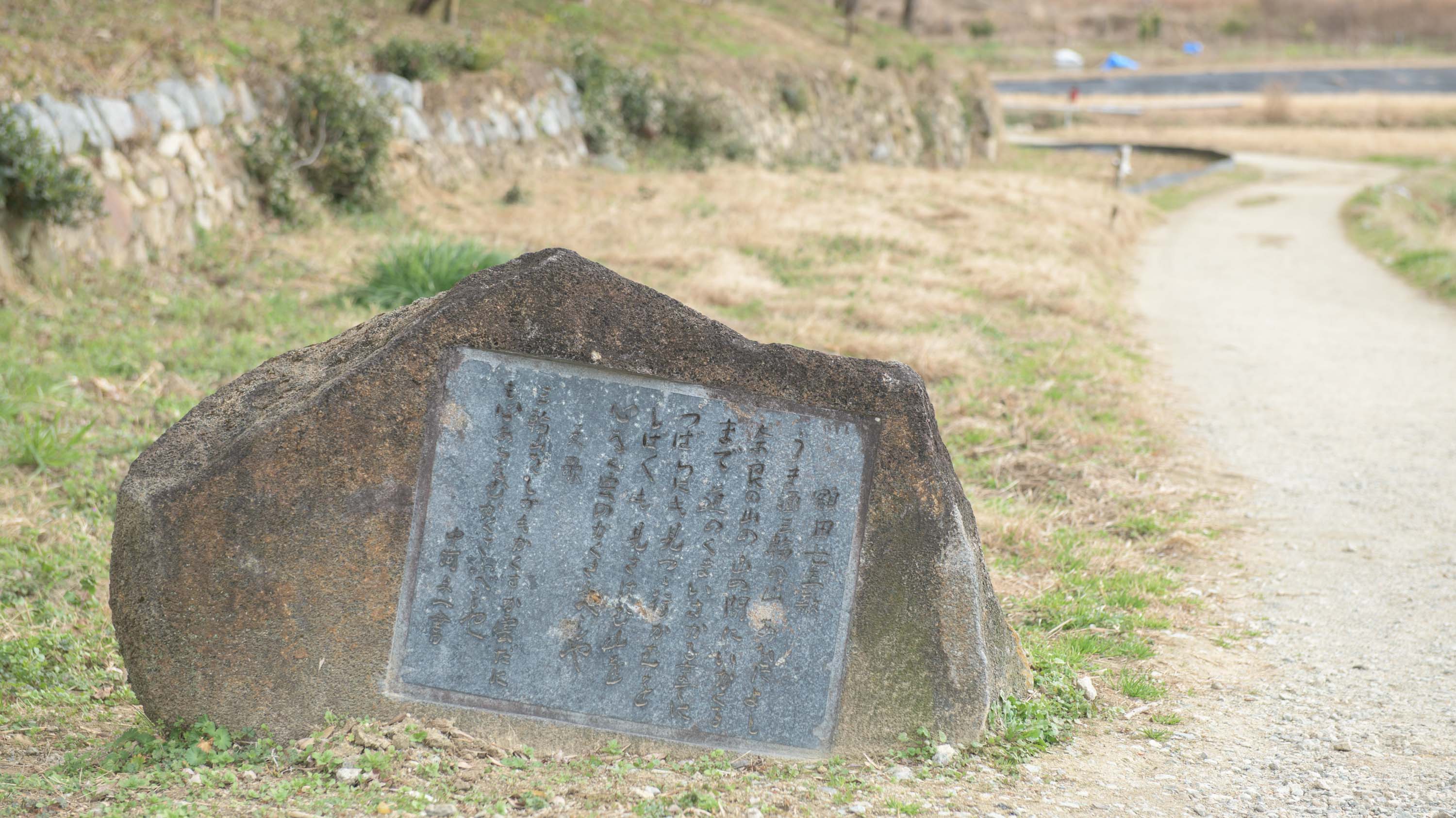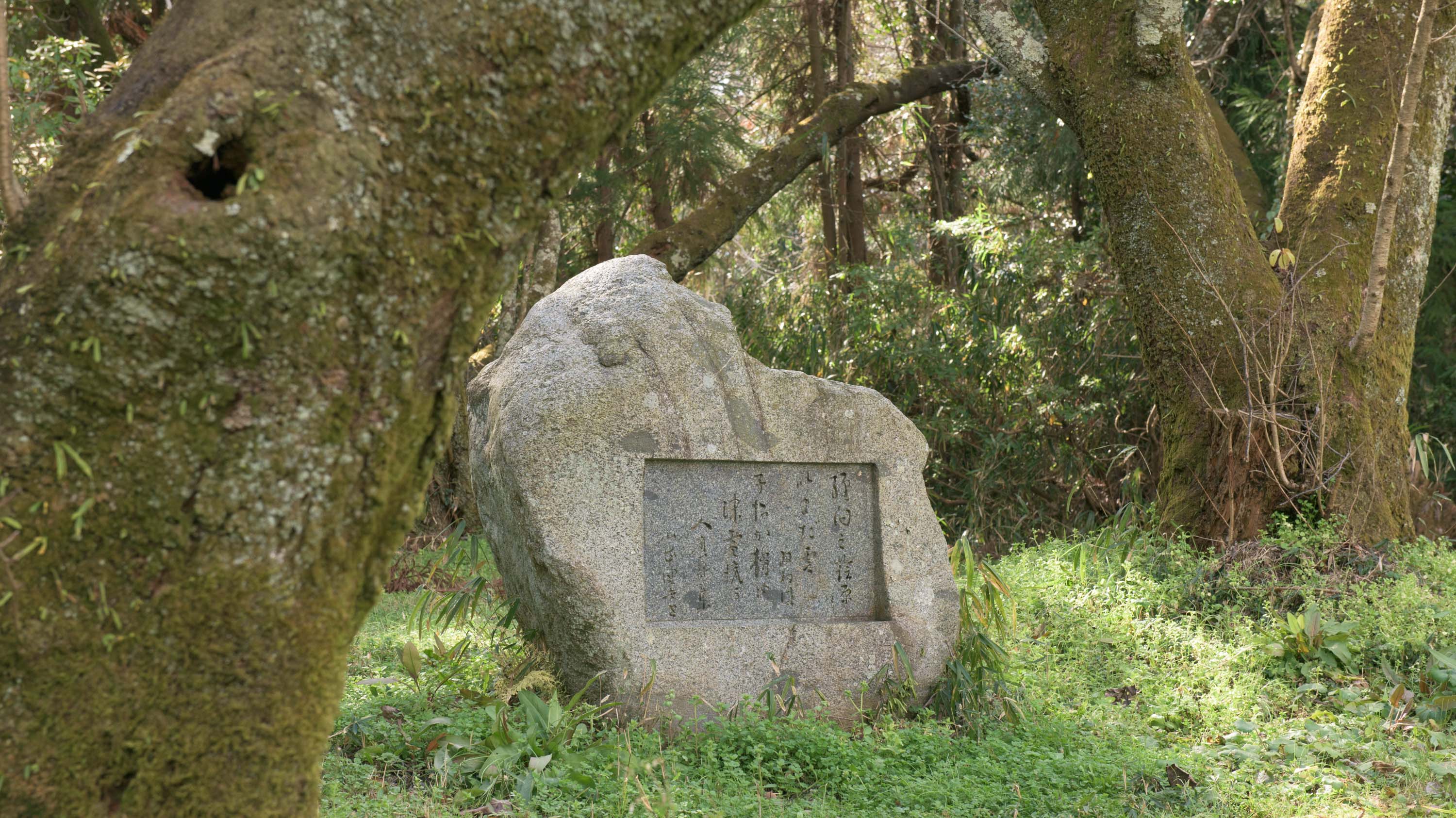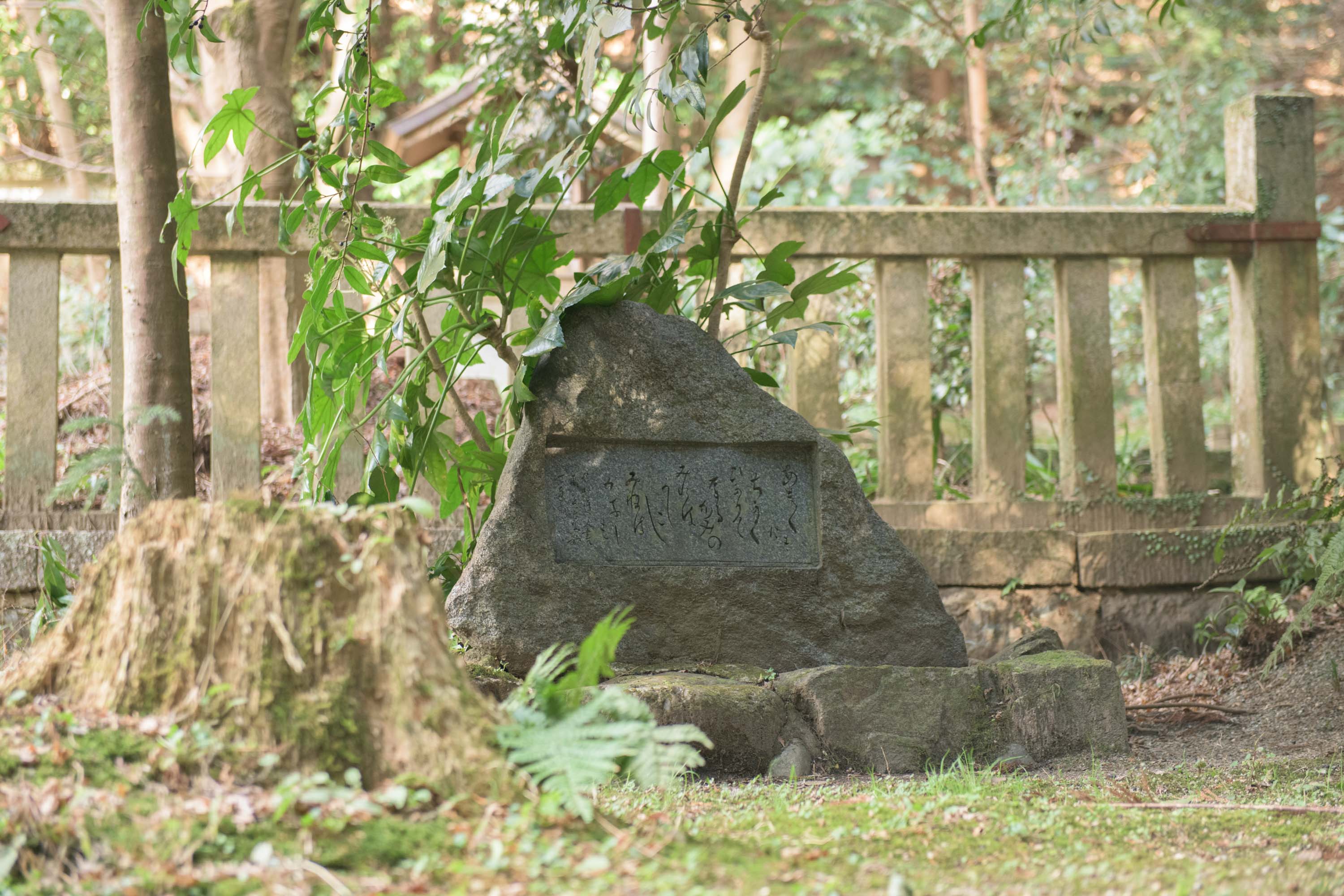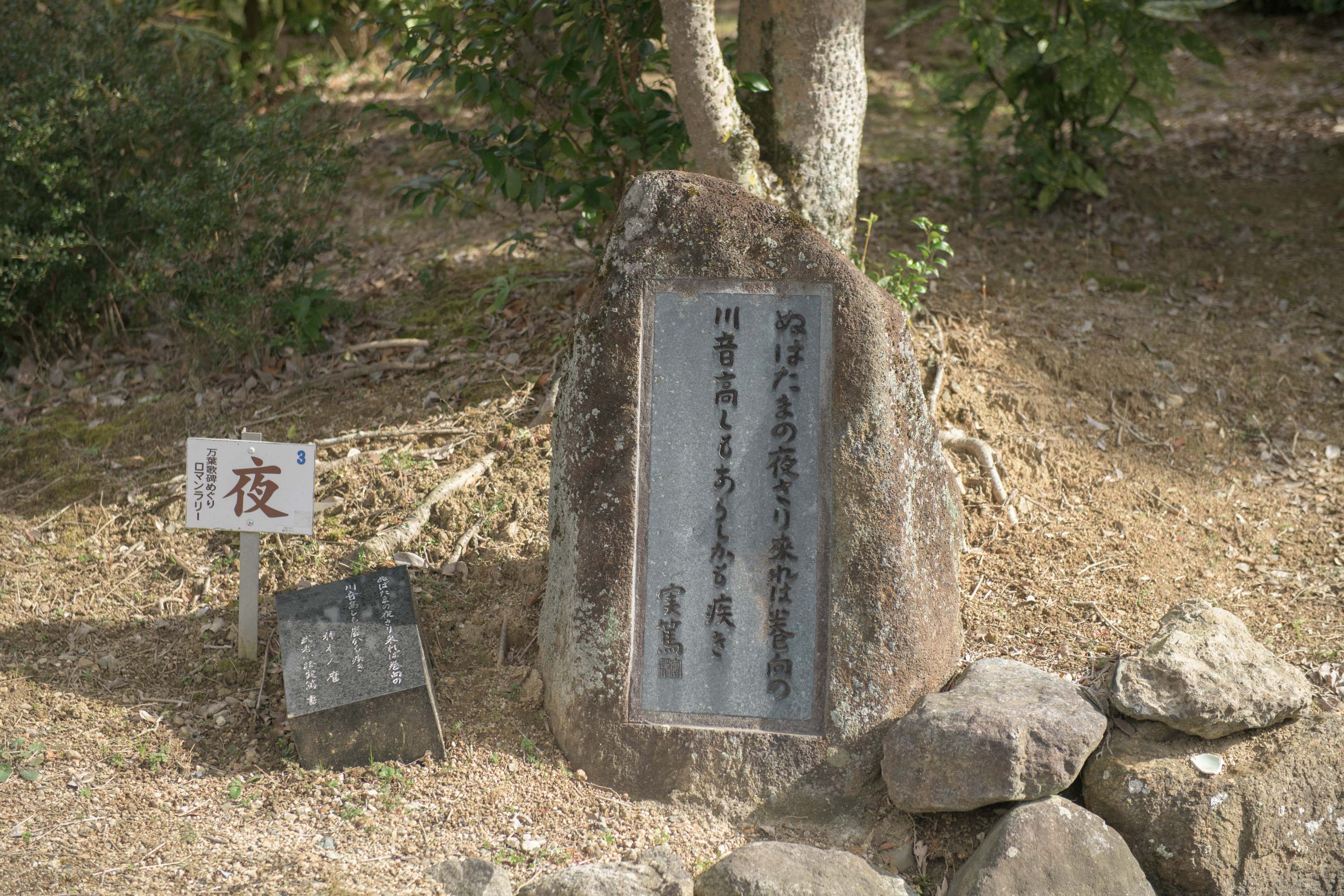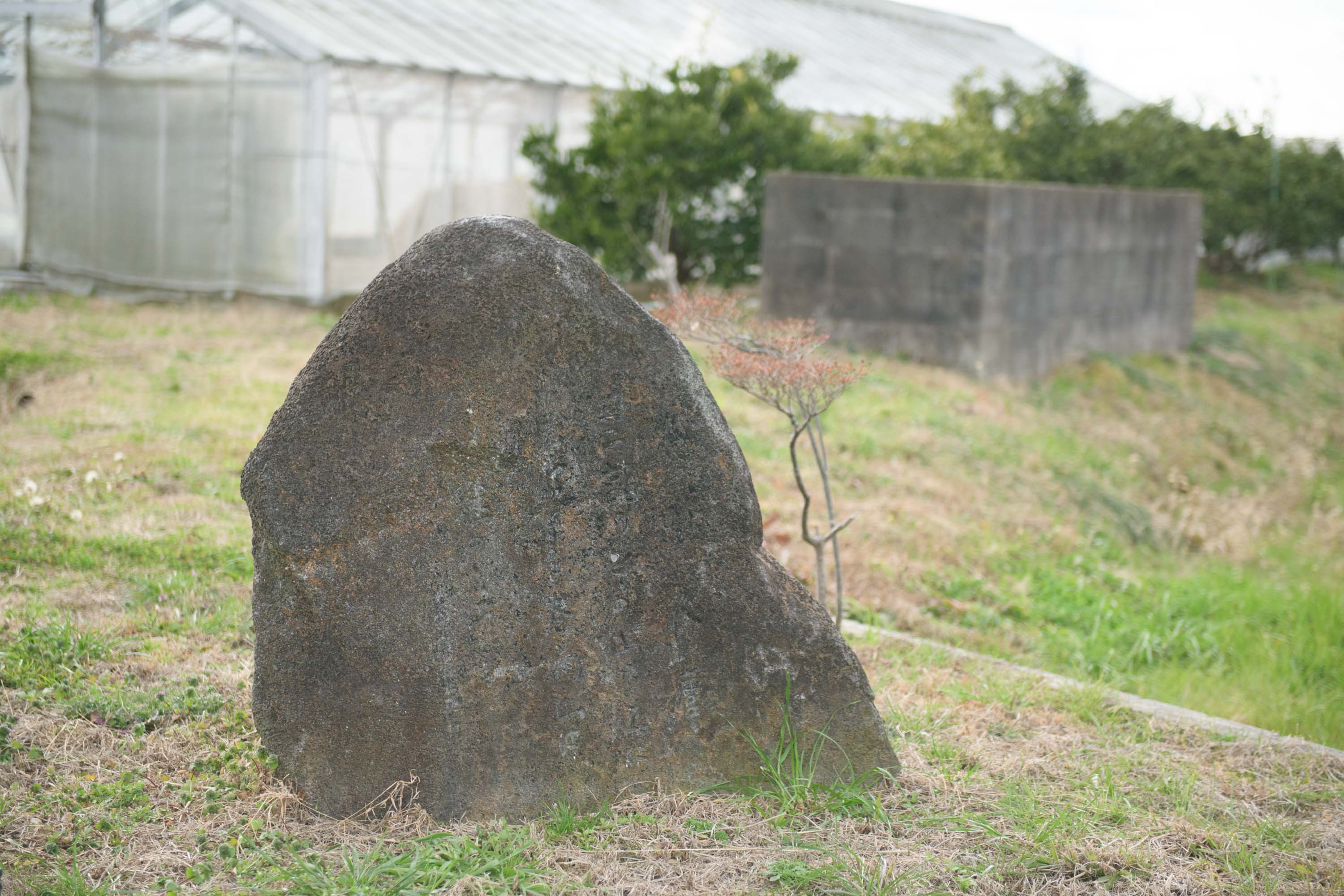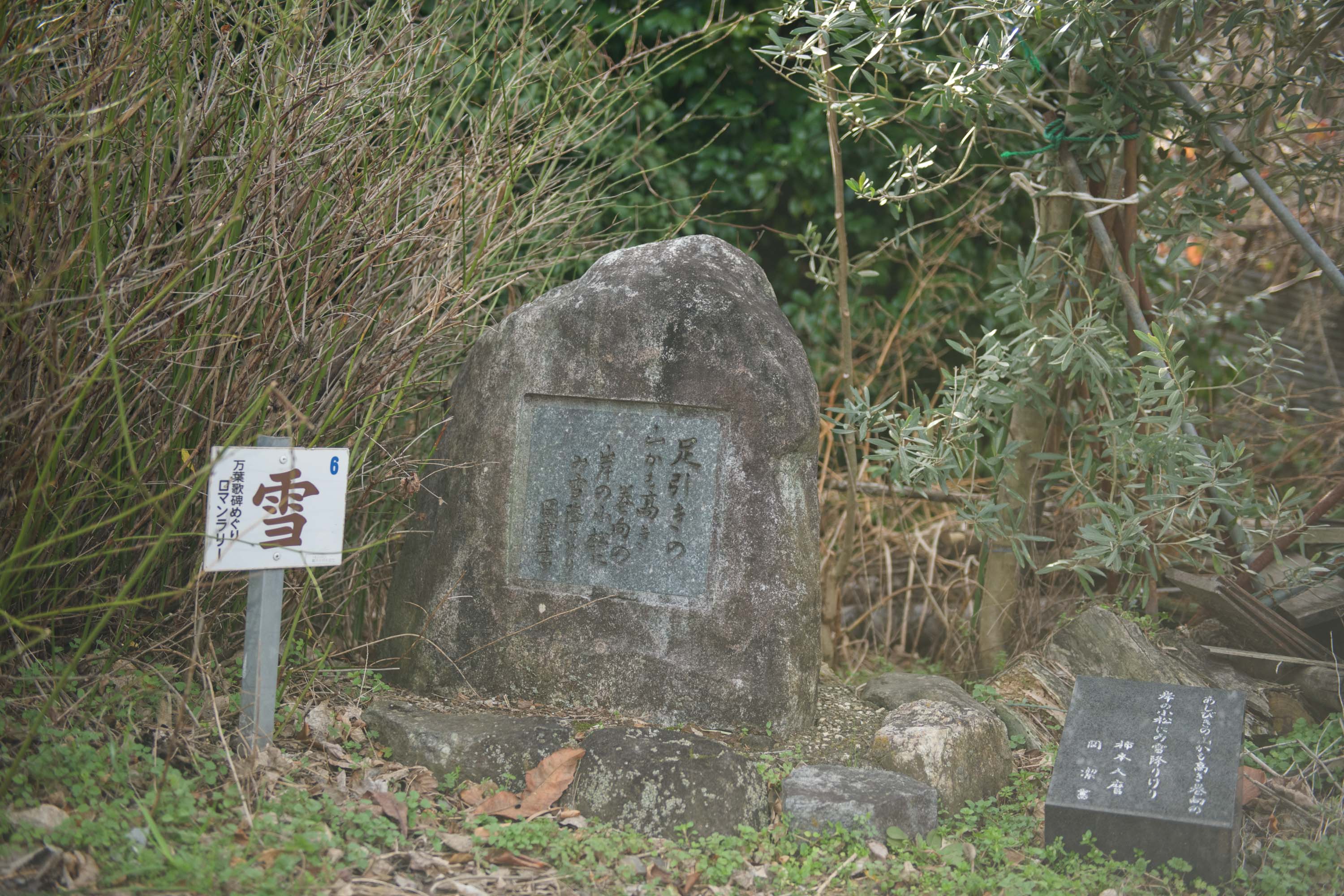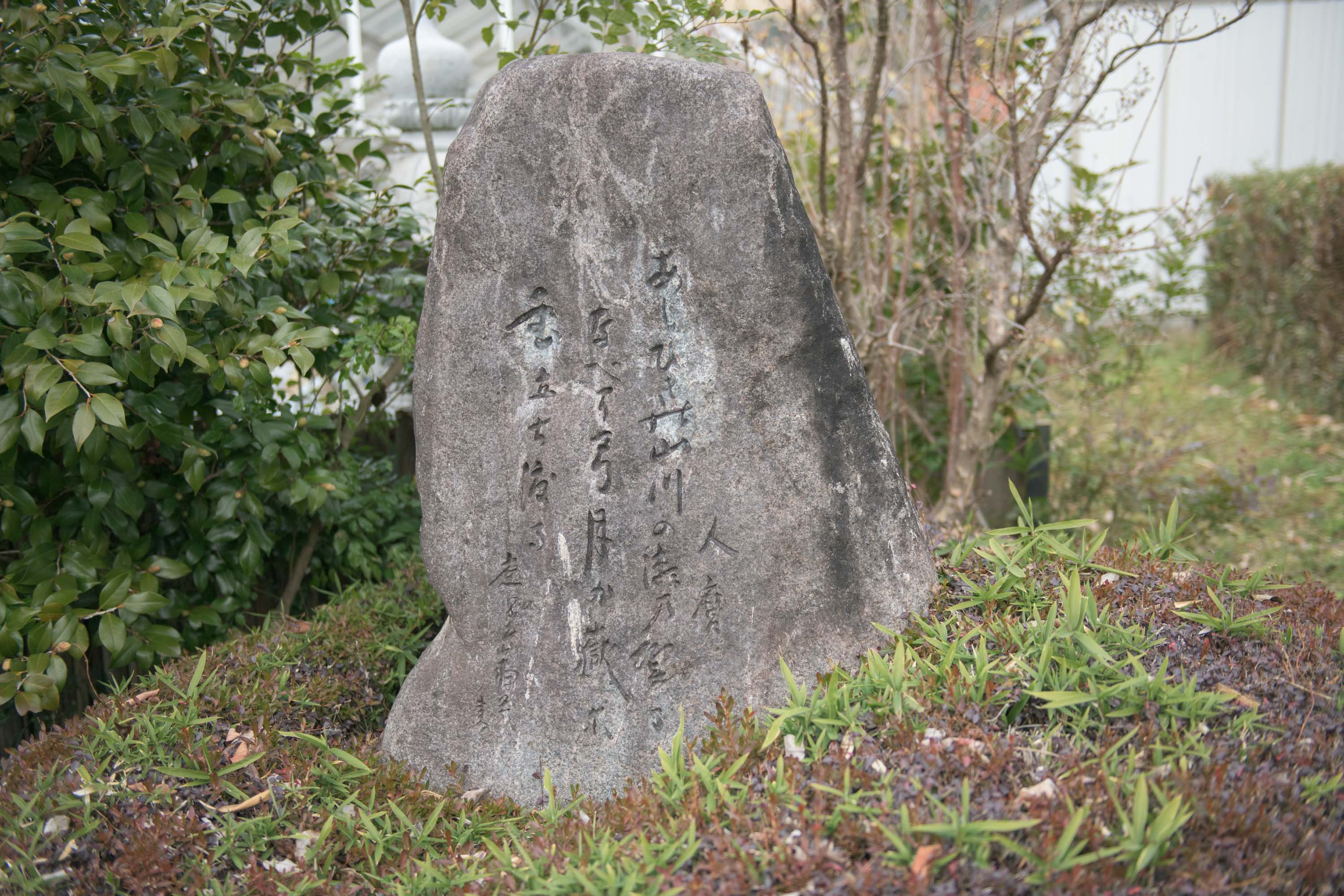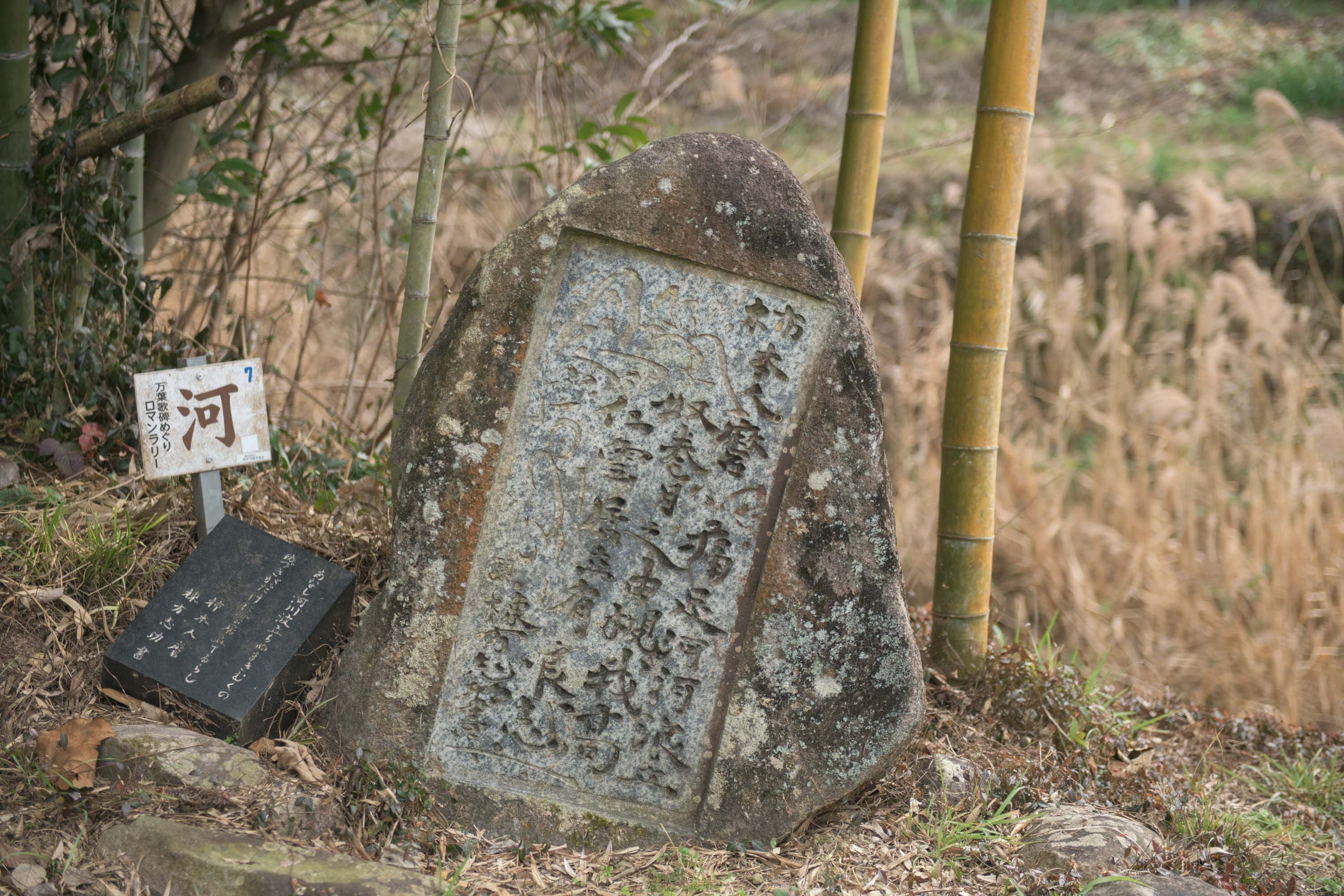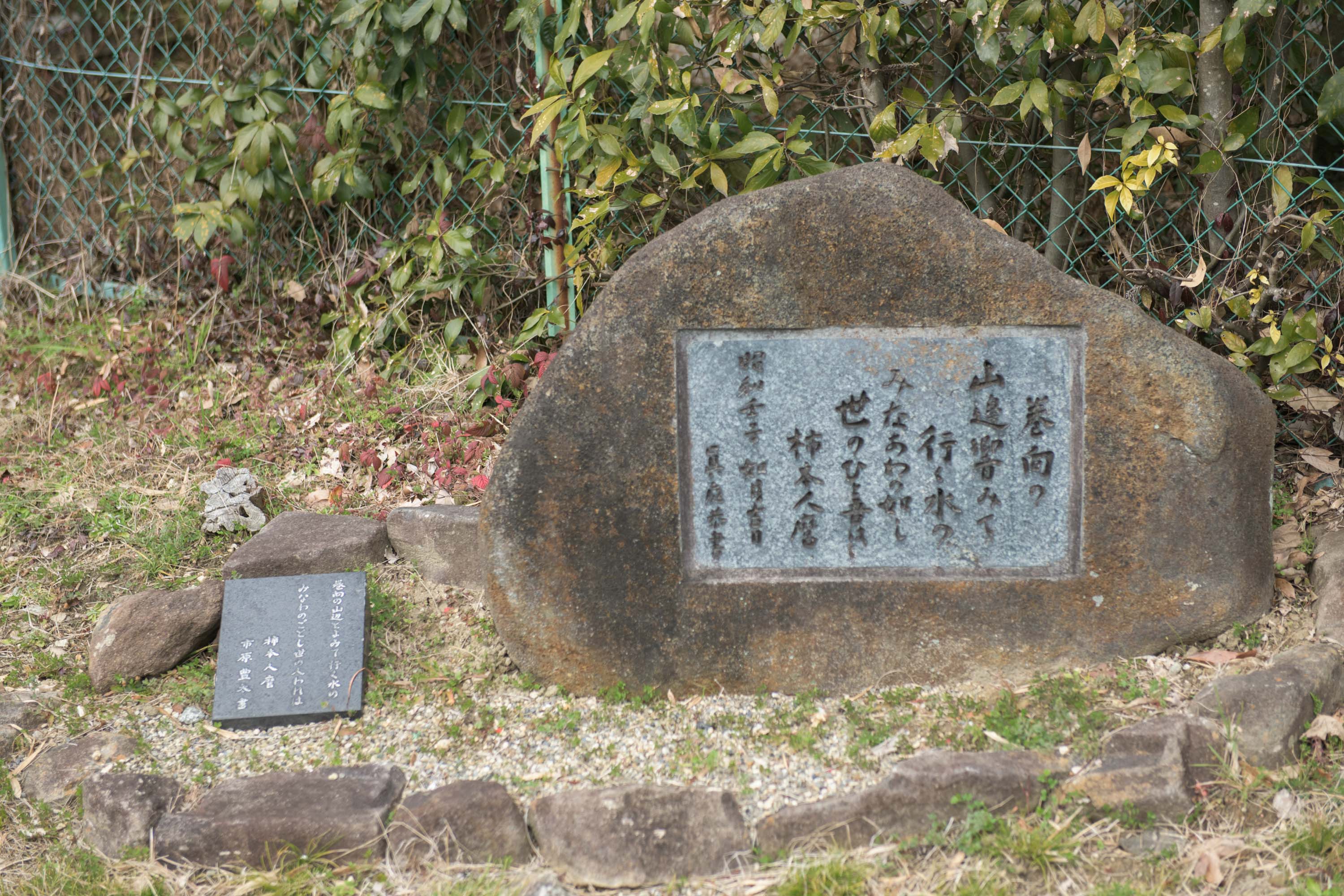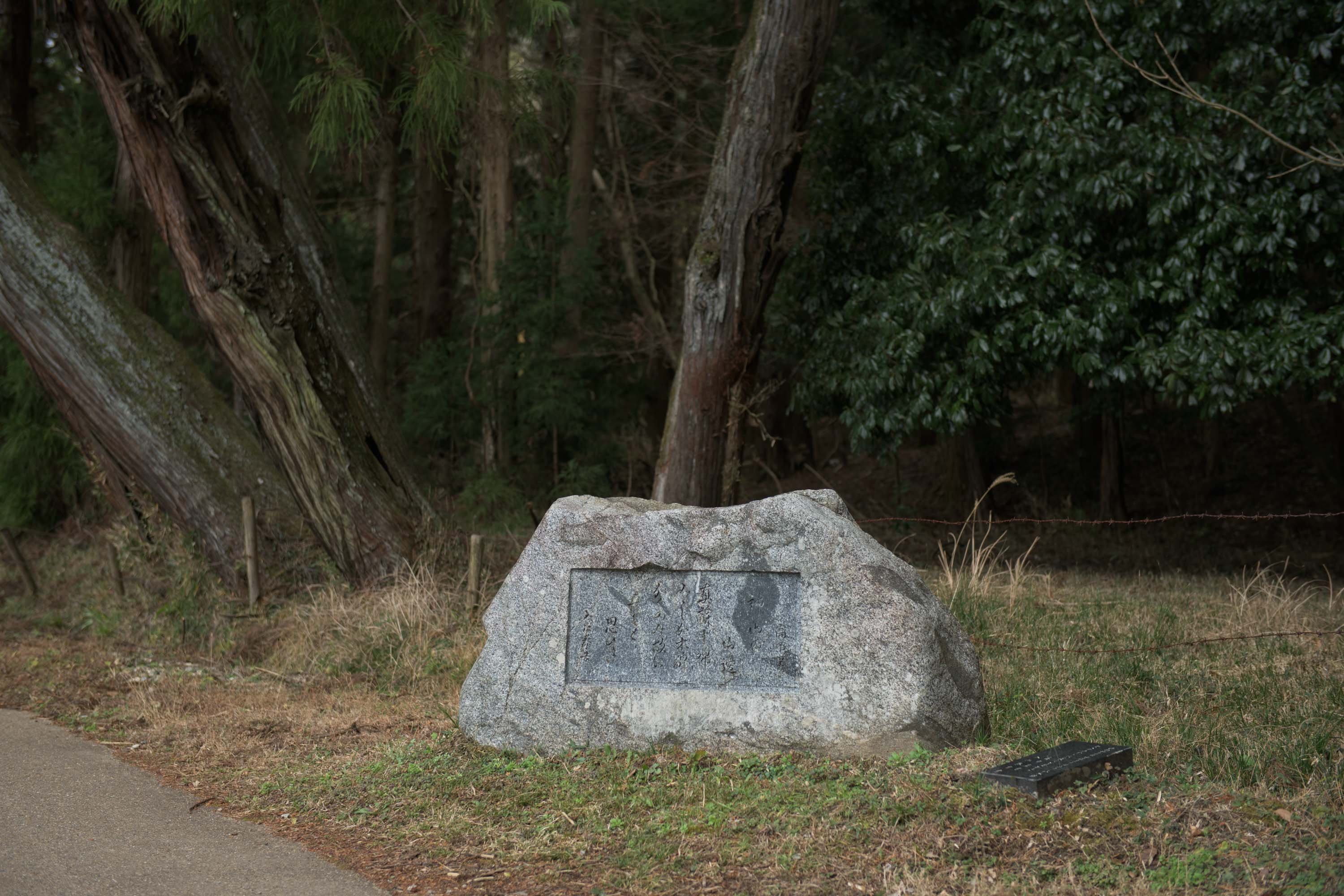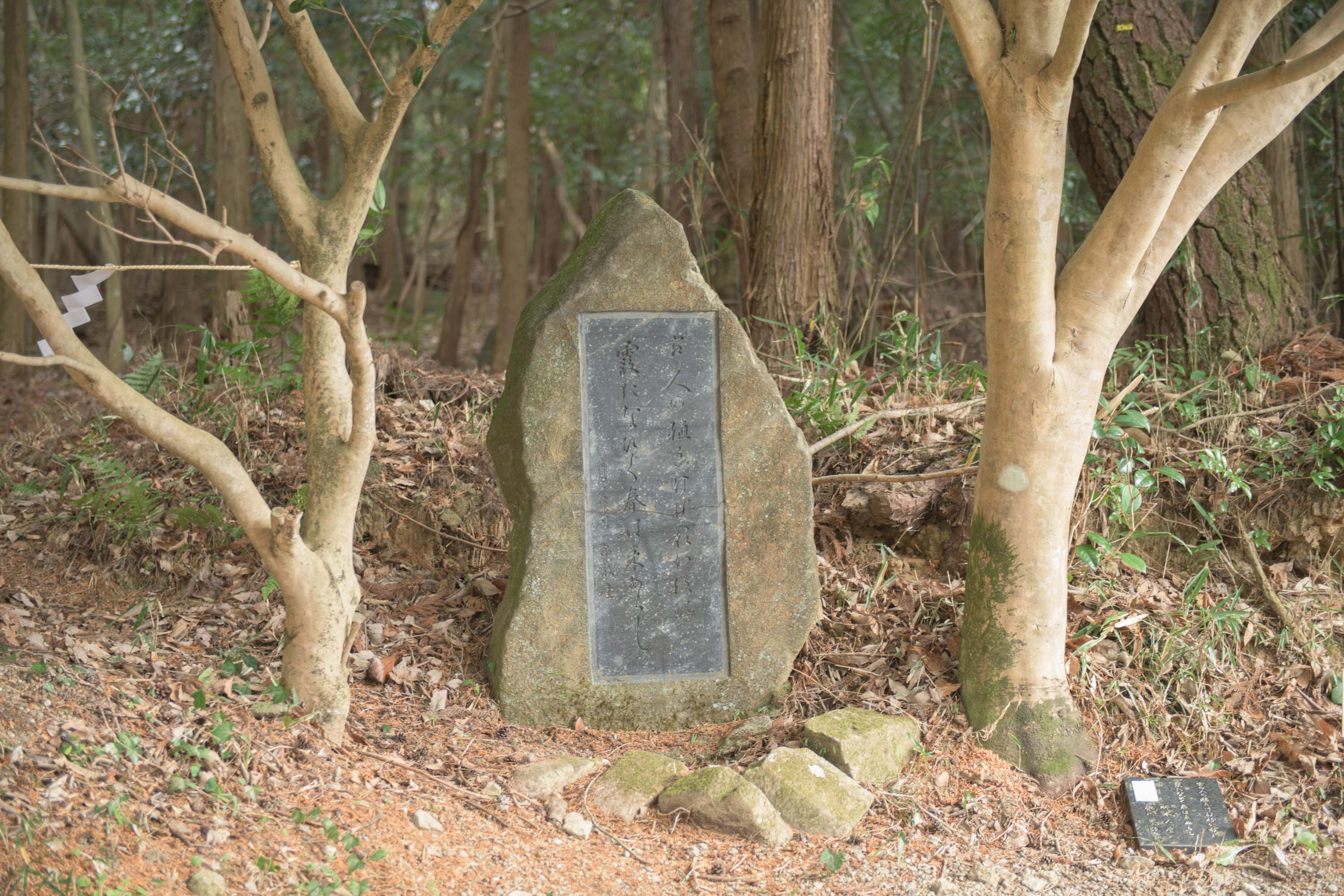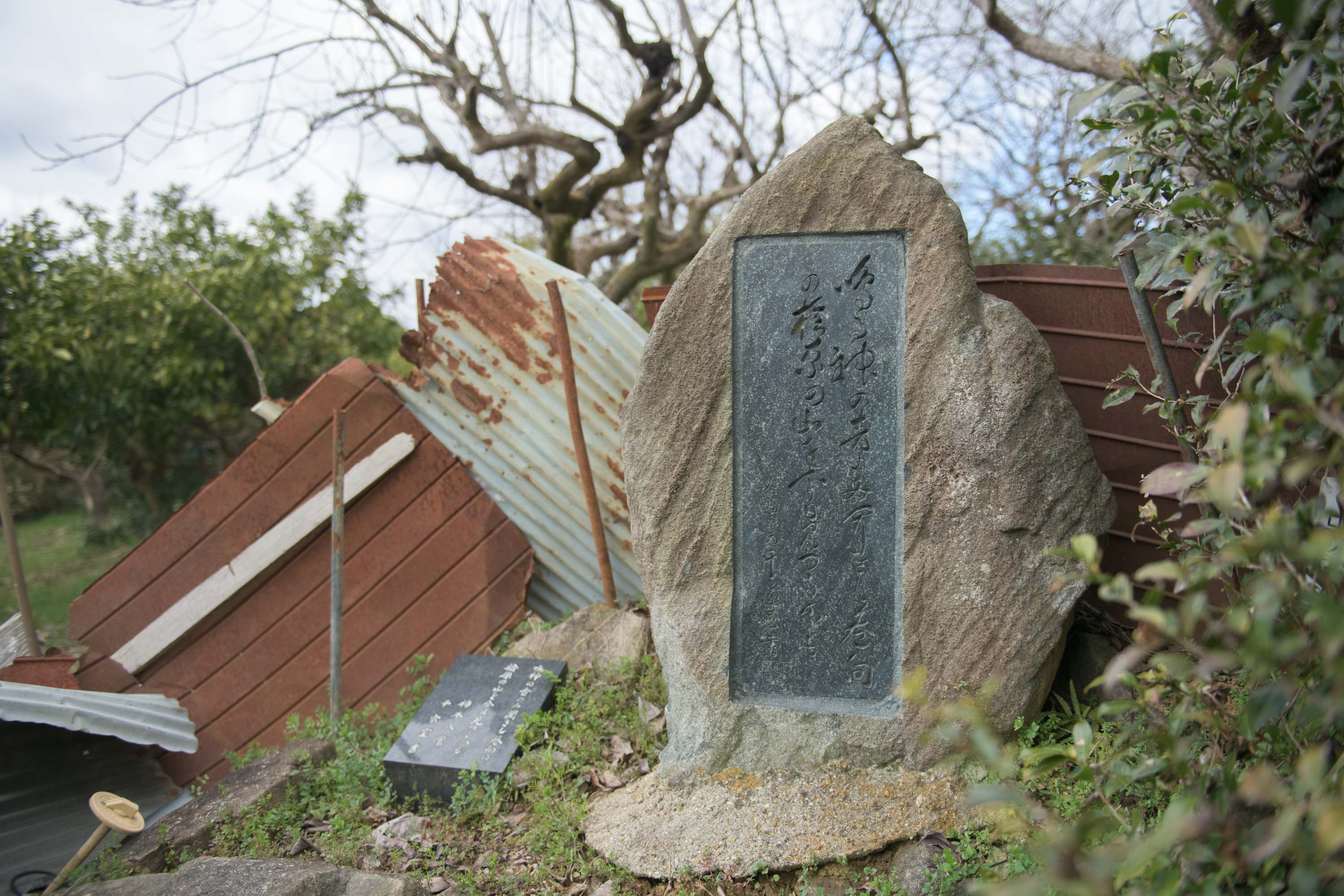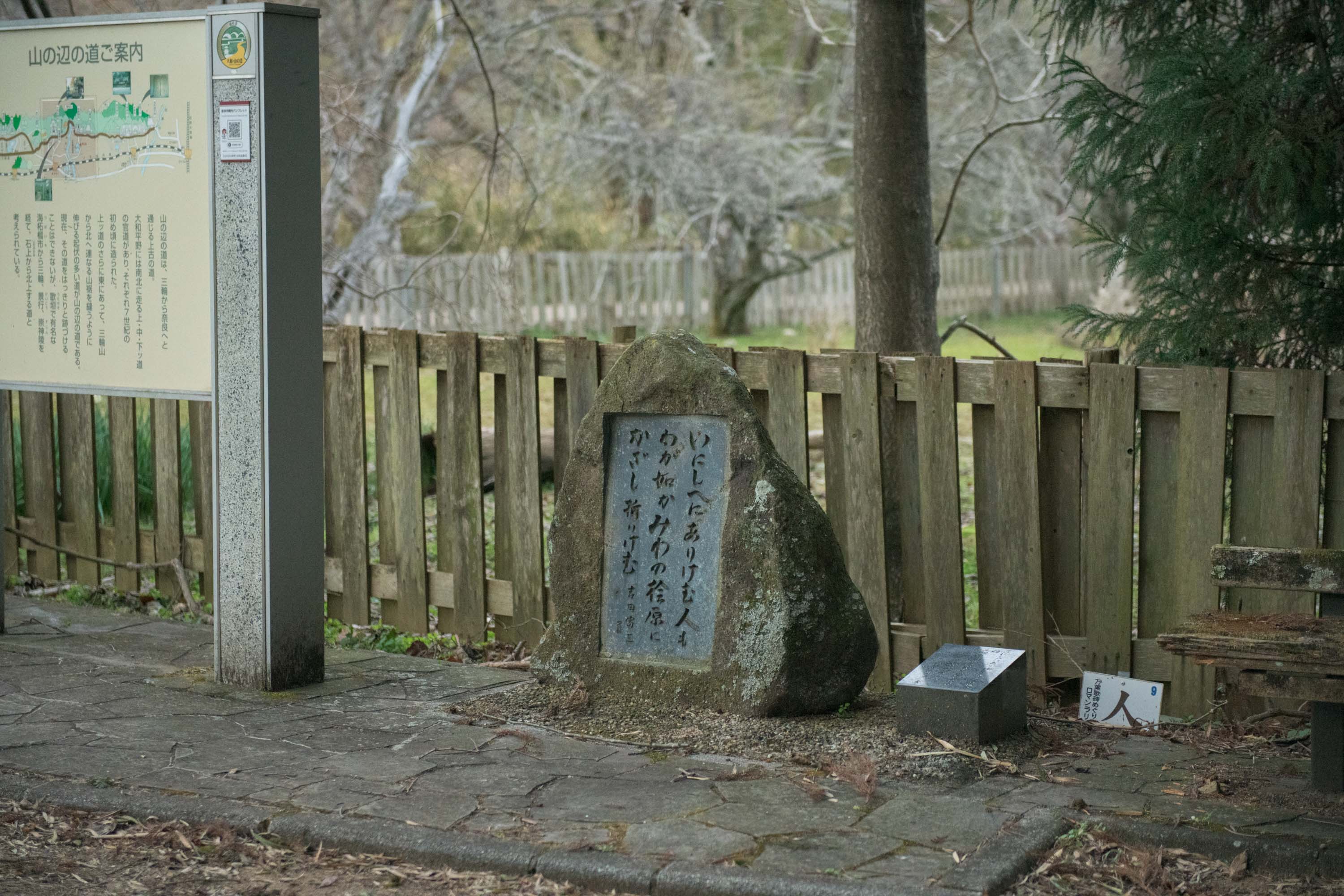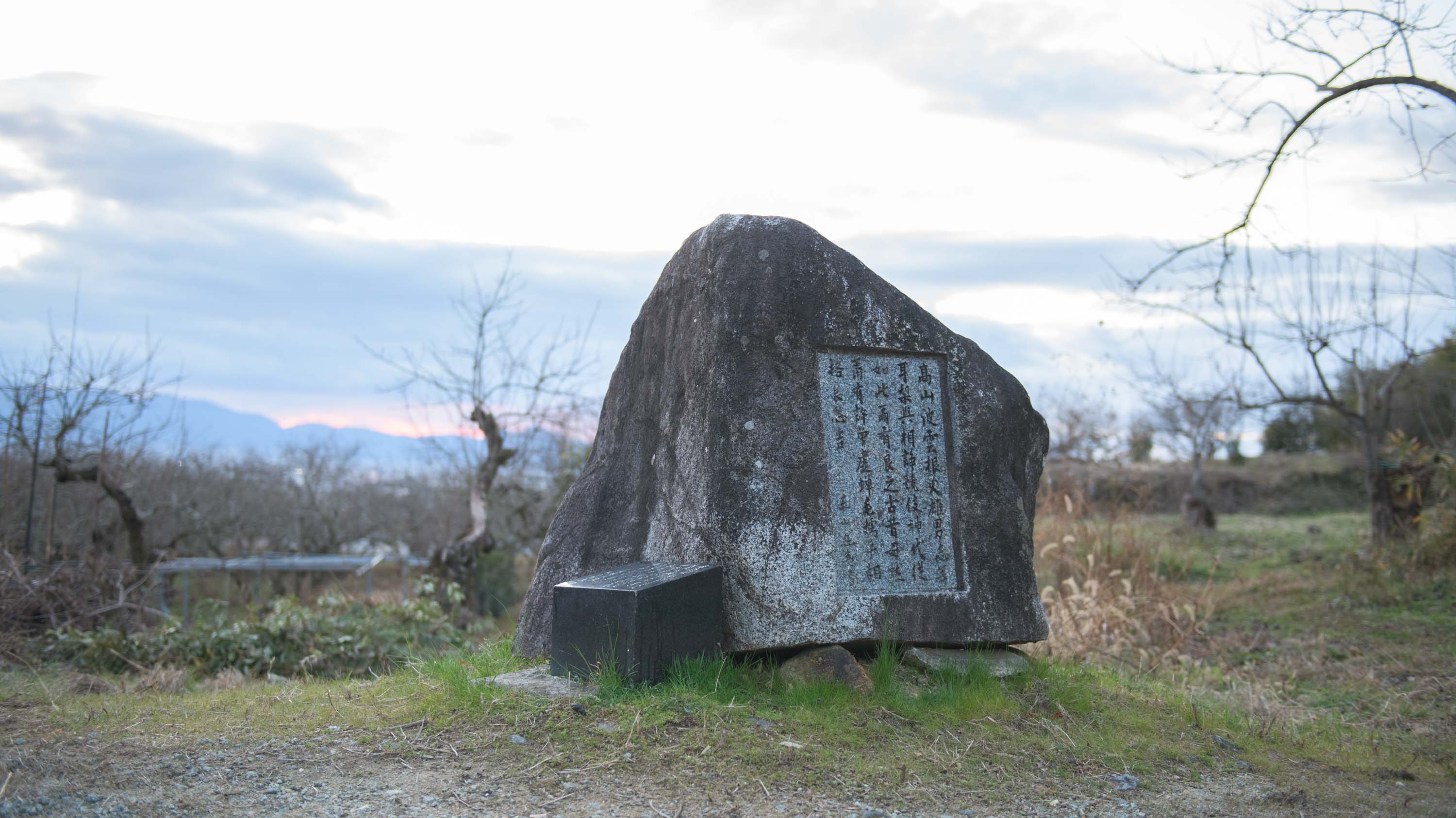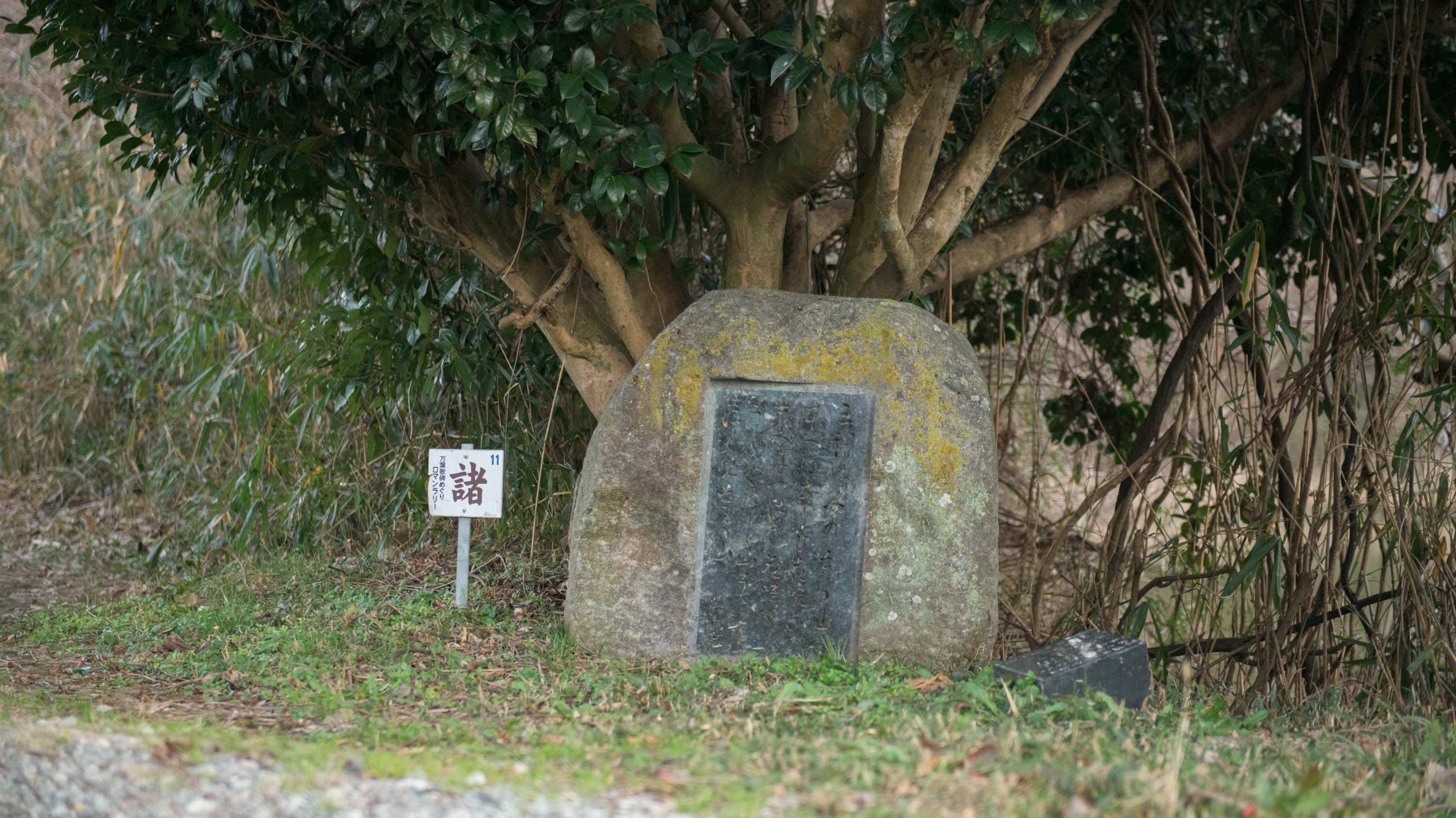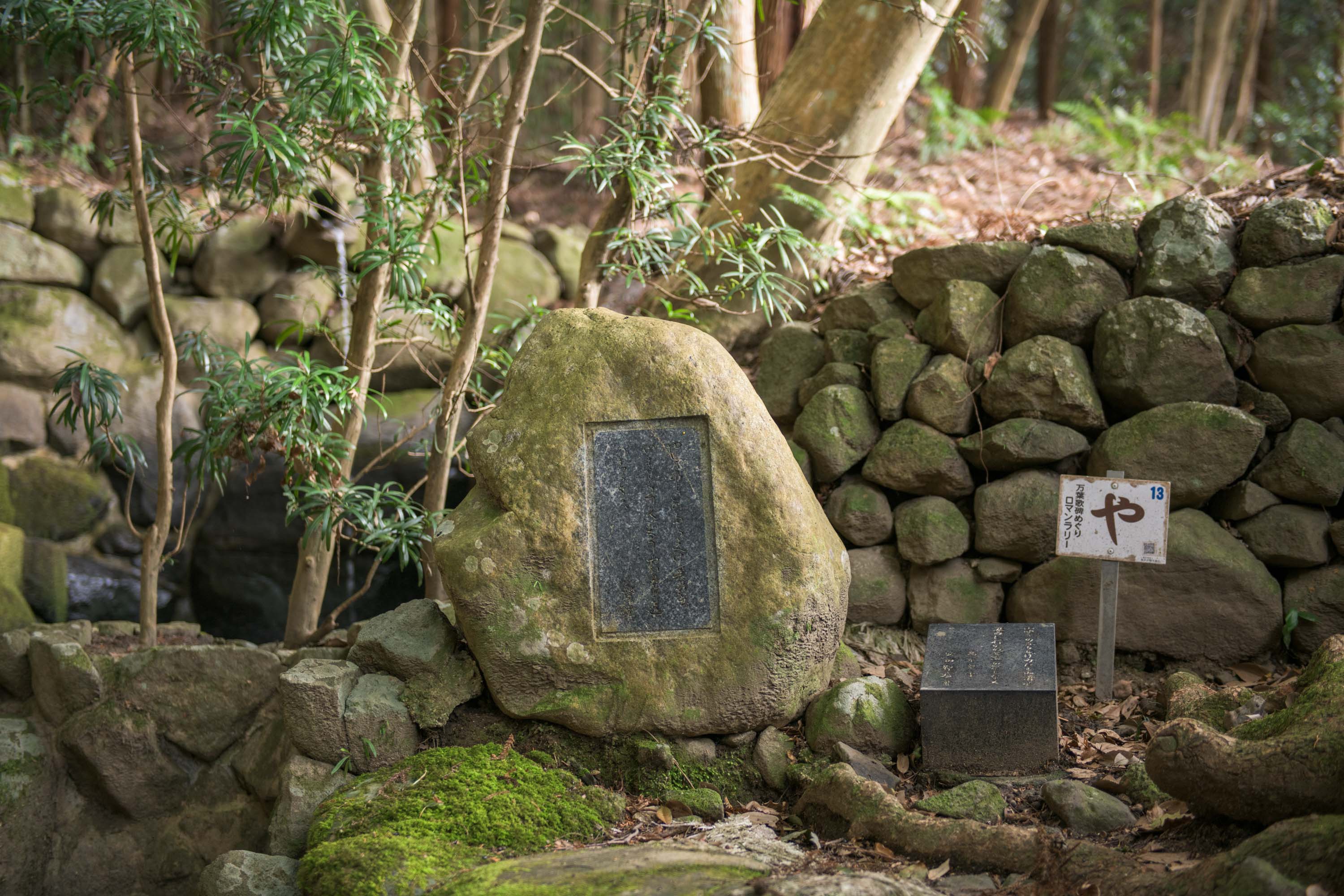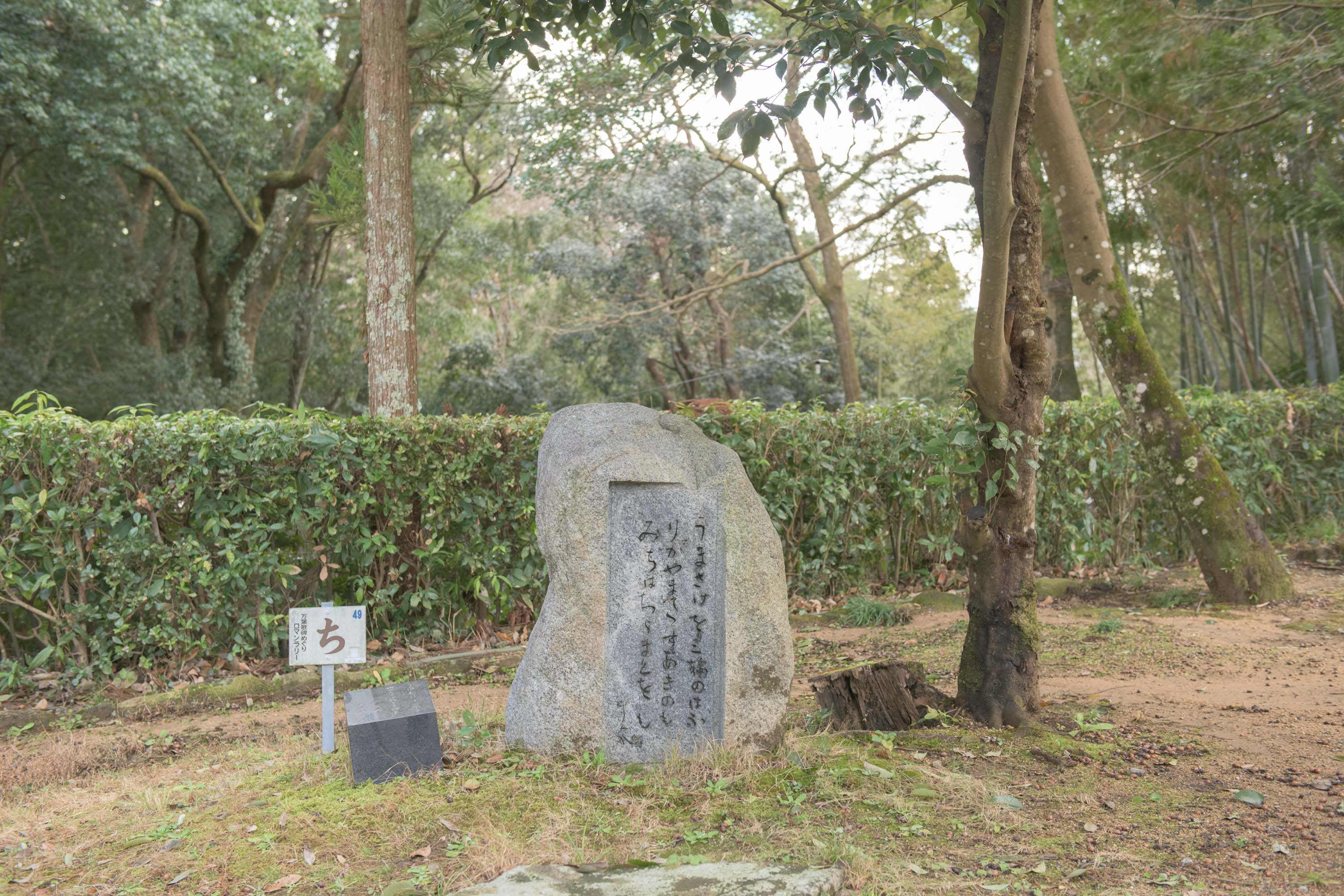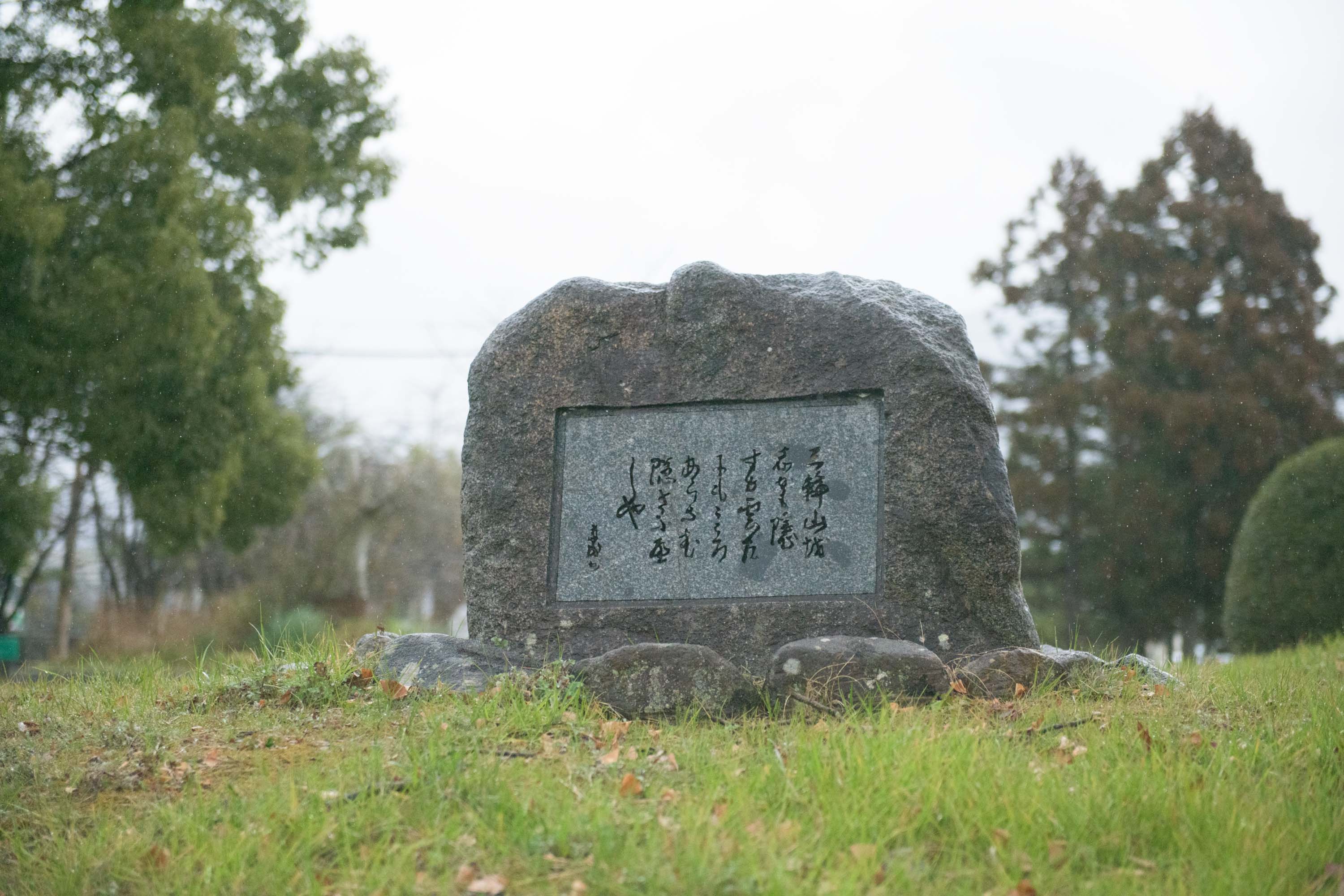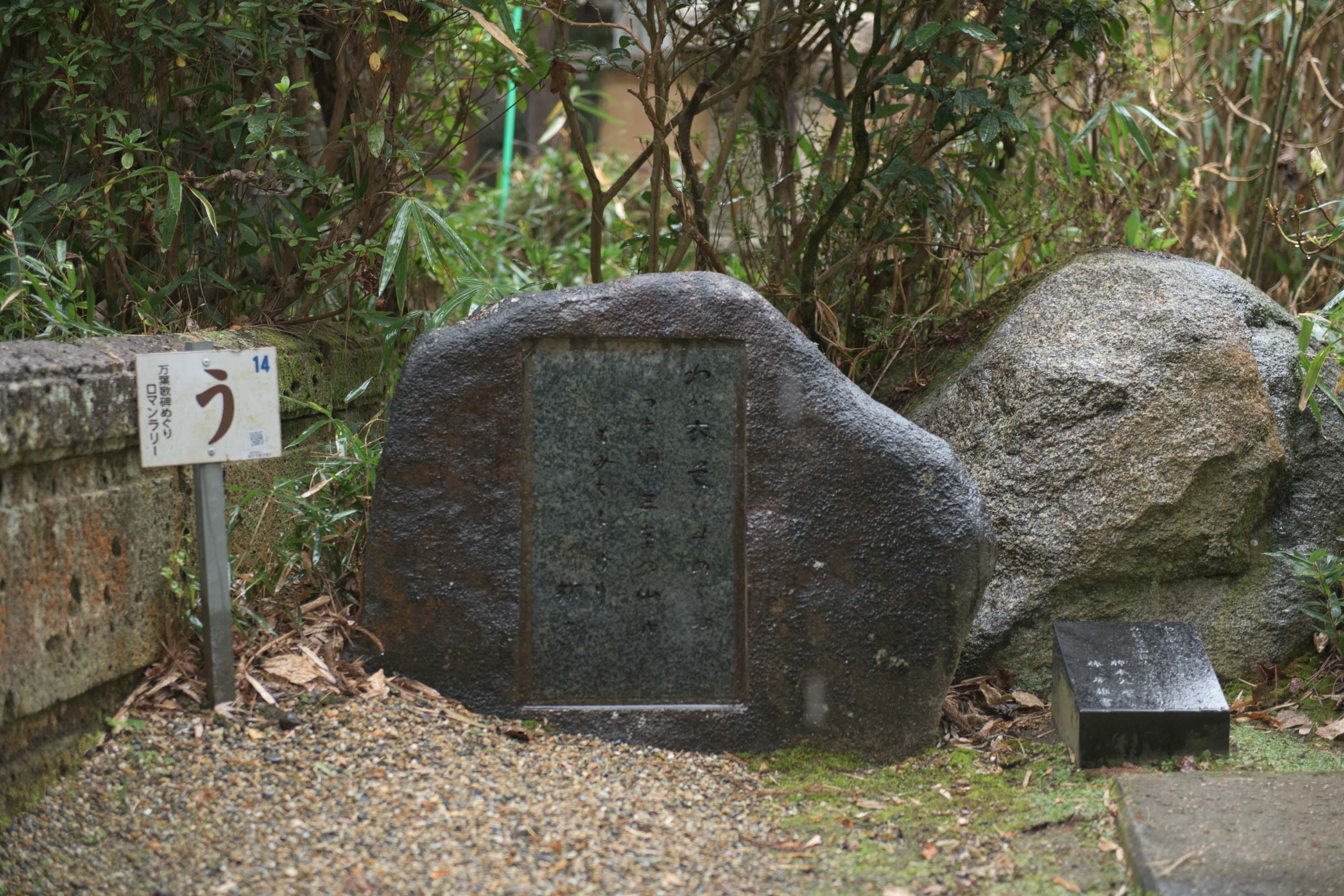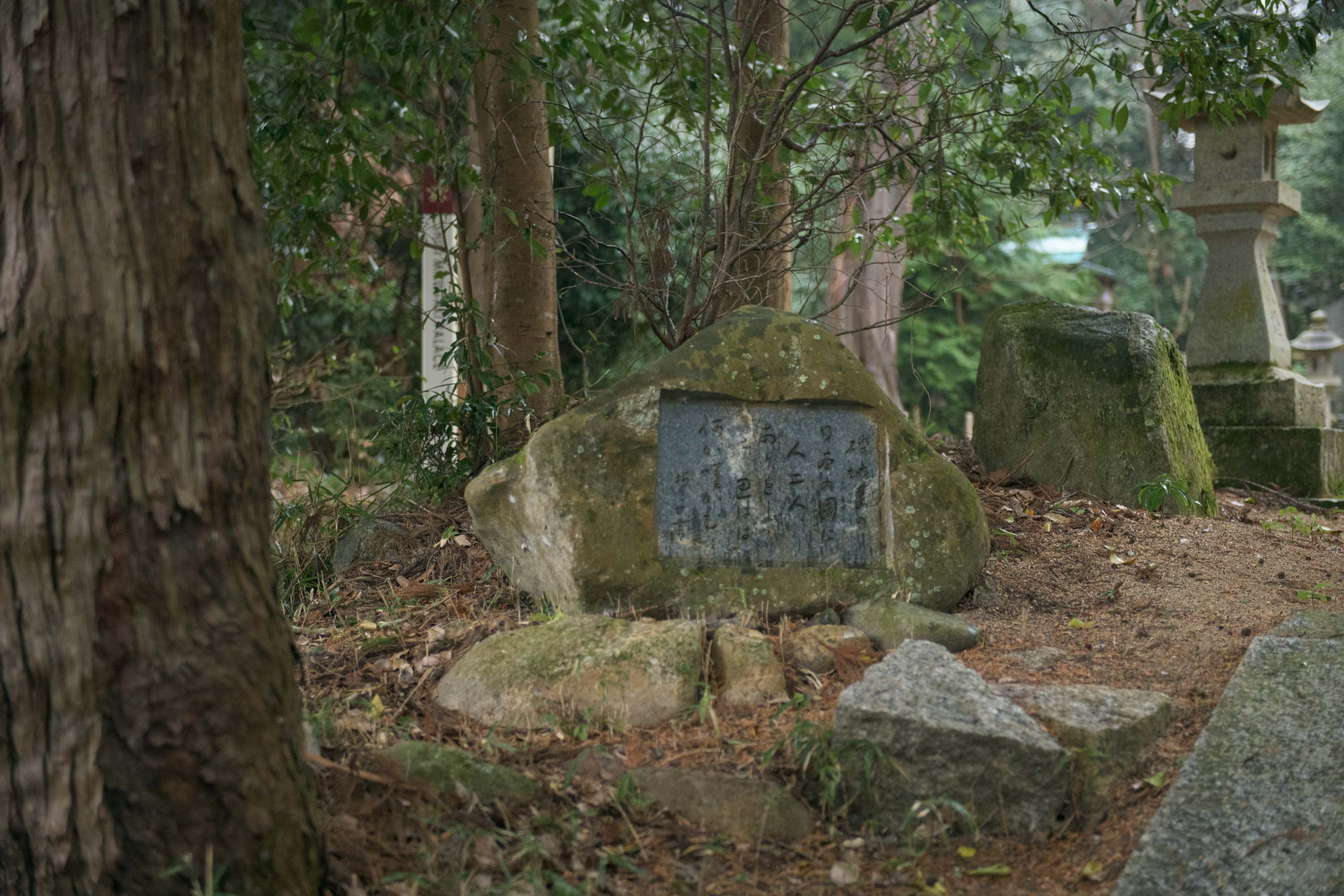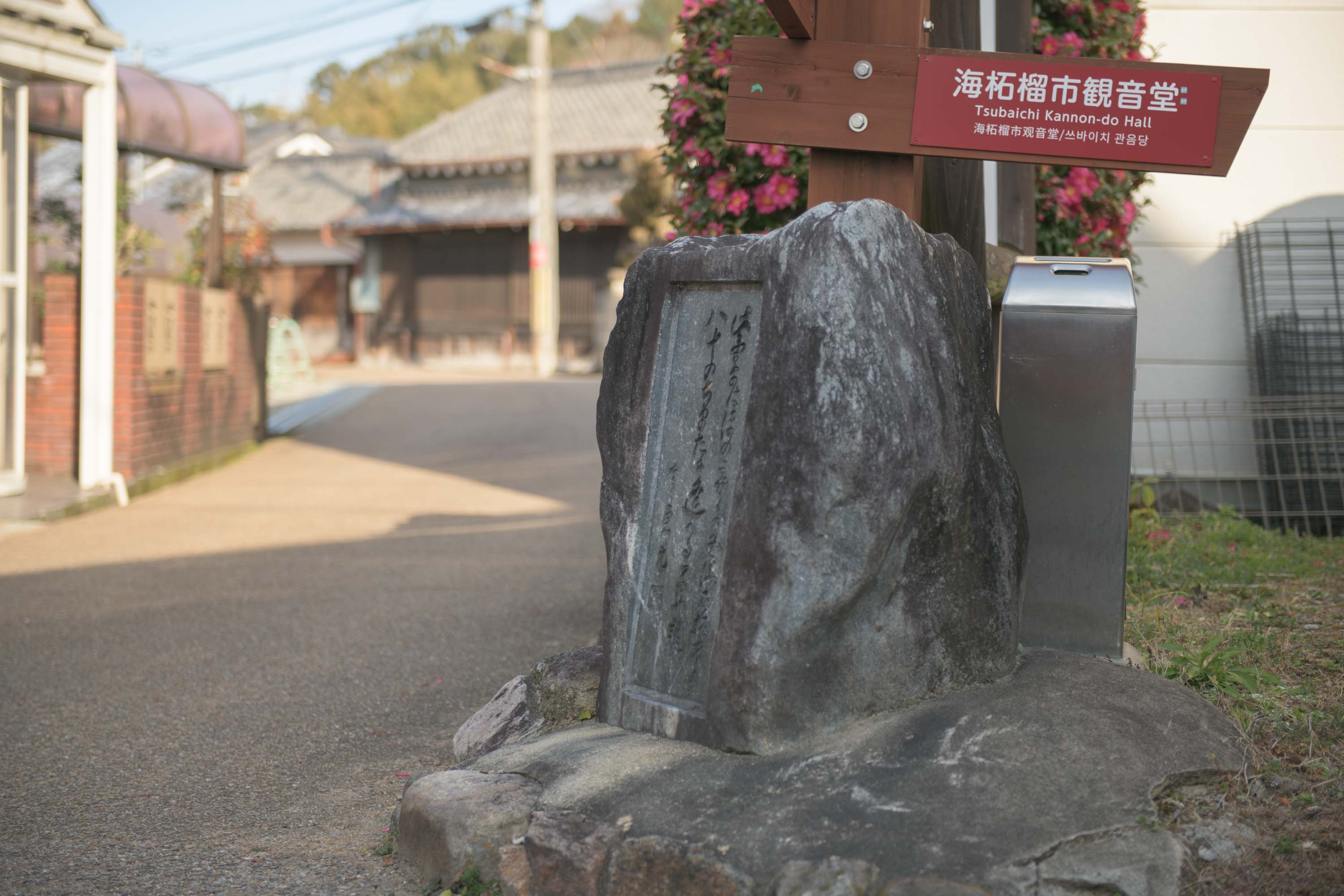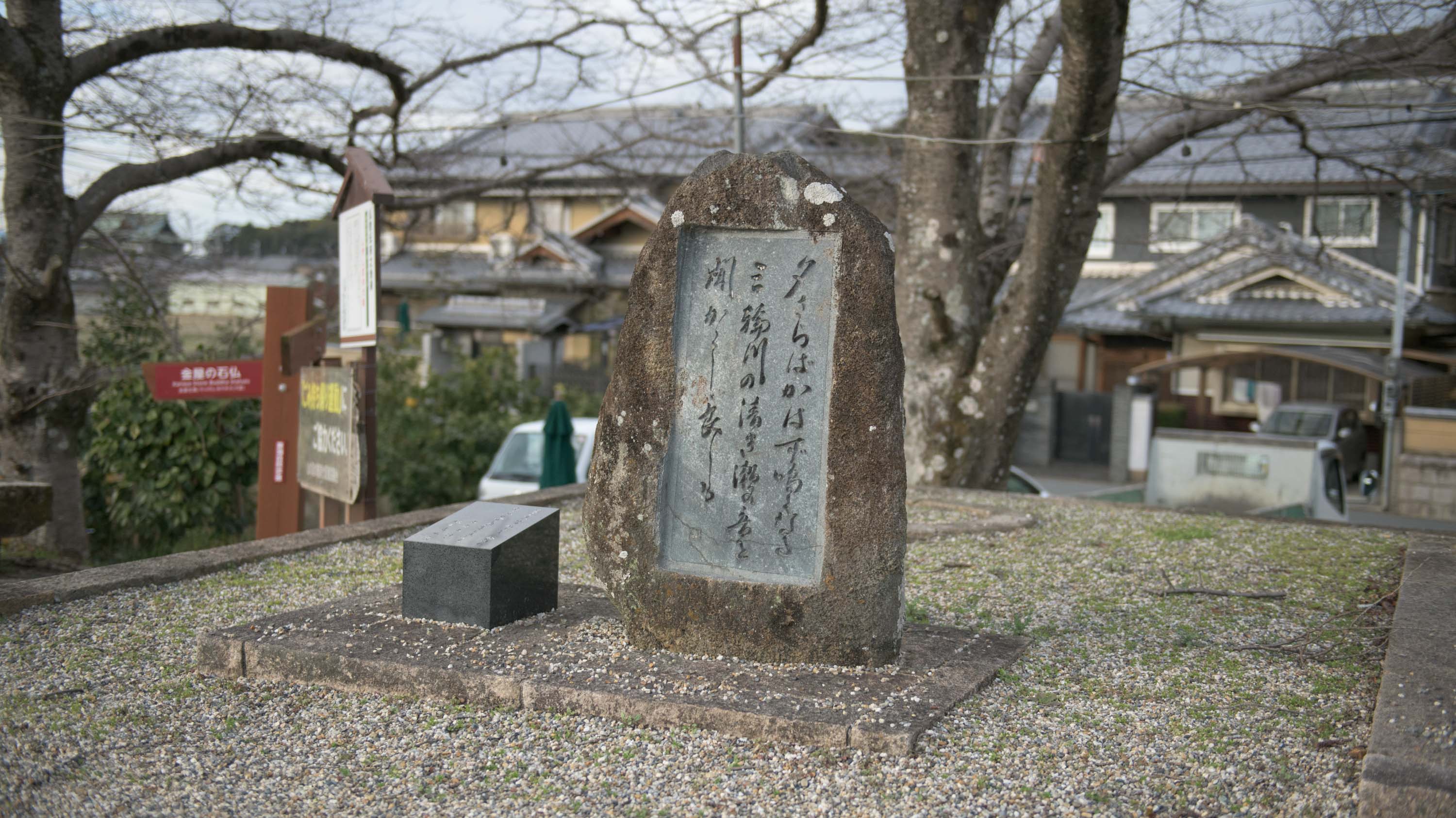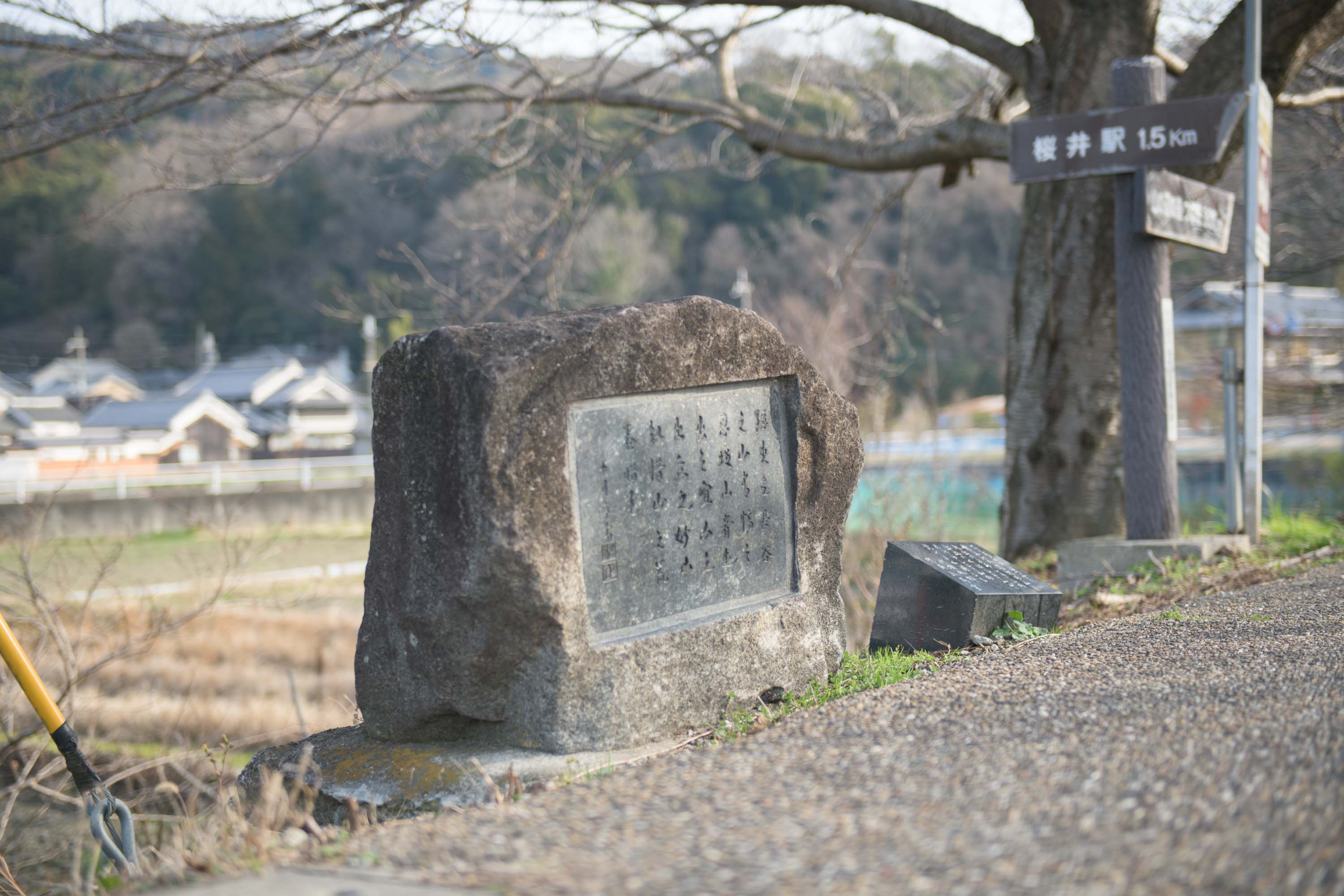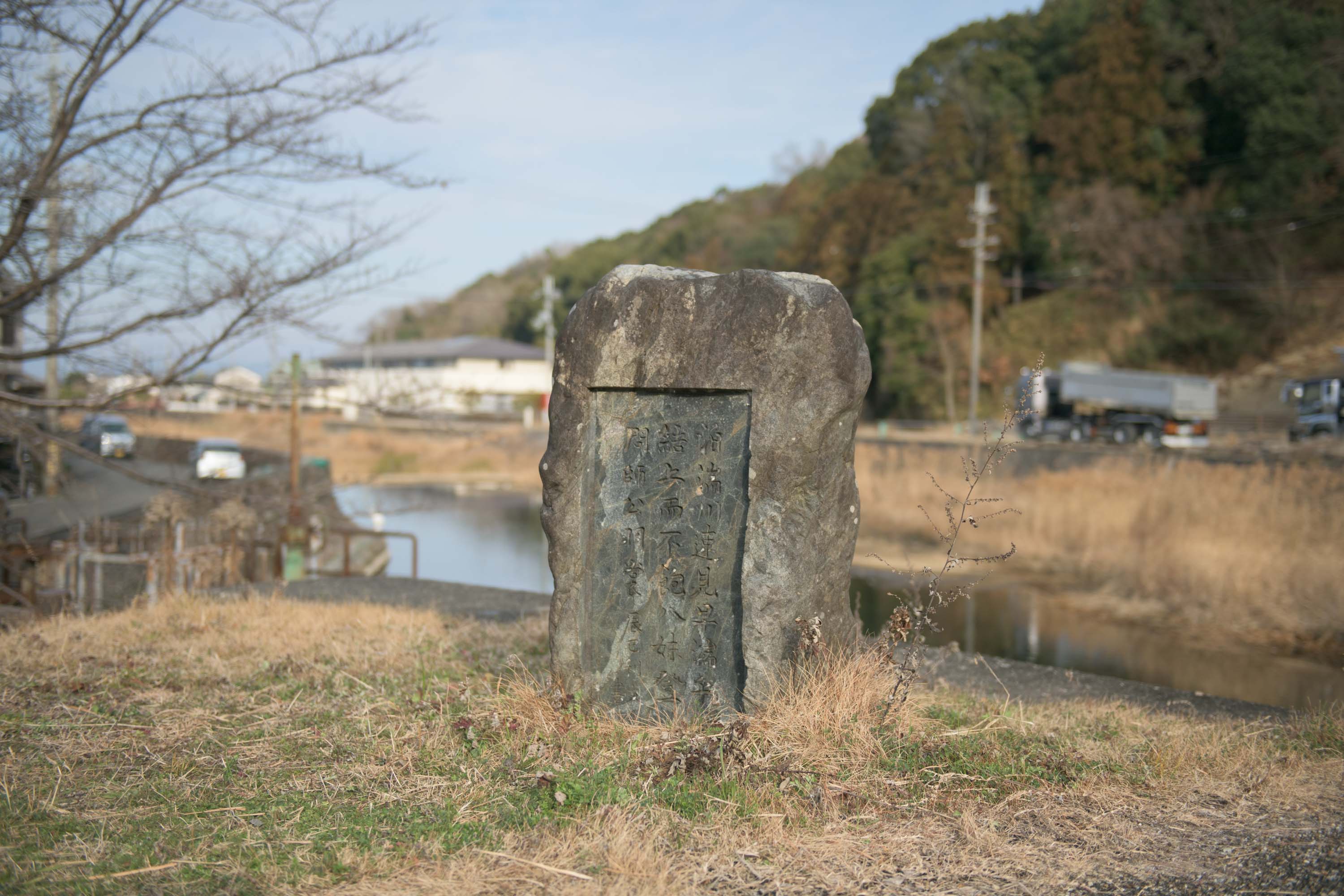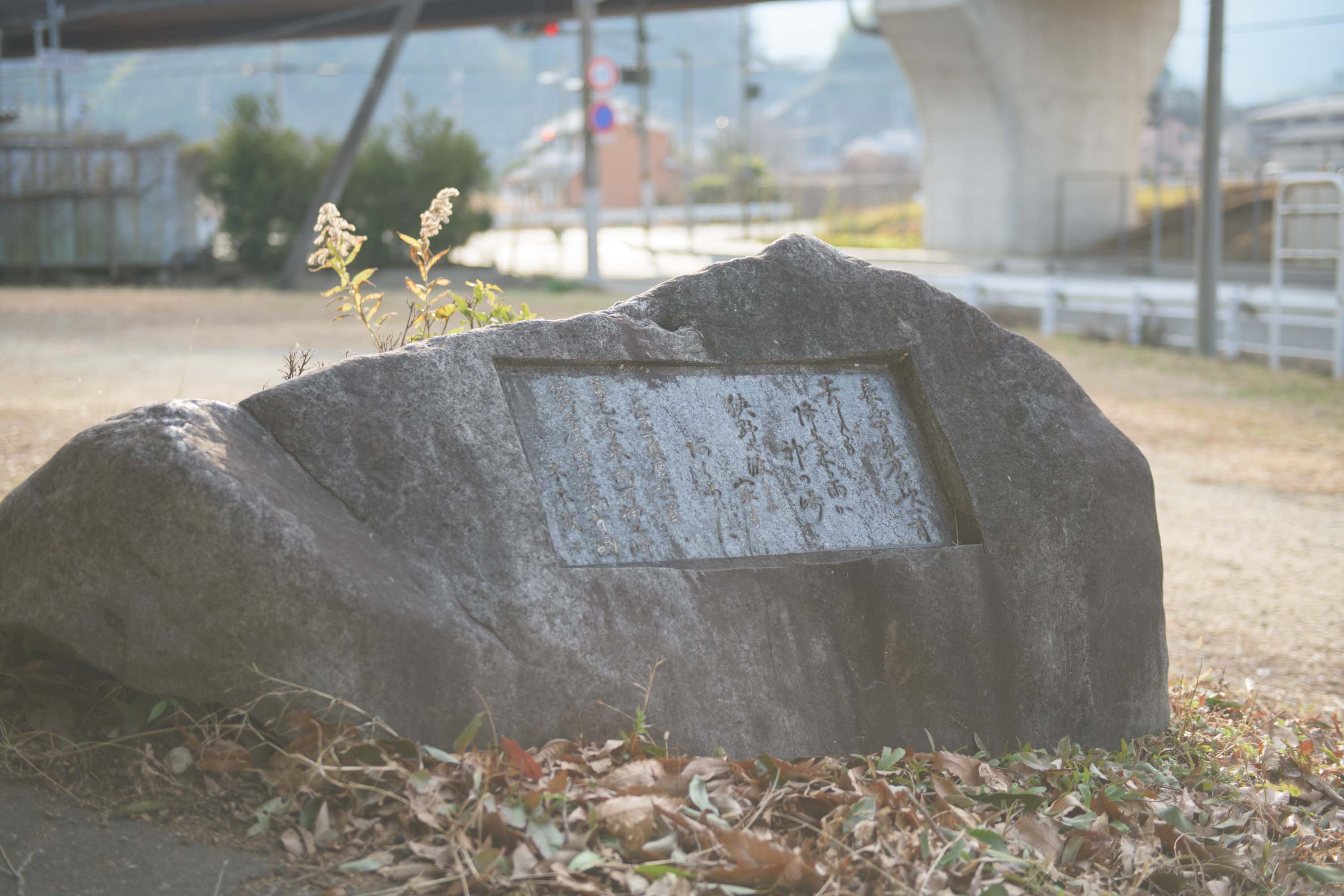Monument No.1
(Vol.1, No.17)
Princess Nukata
I wanted to look
to my content
upon Mount Miwa
till it was hidden
by Mount Nara
and the curves
along the road
but Clouds—
how could you
so coldly cover it?
Commentary
One of the “miscellaneous poems” from Volume 1. On the 19th day of the 3rd month of the 6th year of the reign of Emperor Tenji, the Emperor relocated the imperial capital from Asuka to Omi Otsu Palace in modern-day Otsu City, Shiga Prefecture. This poem is believed to describe this event.
Having departed Asuka, Princess Nukata heads north to the new capital, Omi-kyo (Otsu City, Shiga Prefecture). Mount Miwa was the guardian deity and symbol of Yamato Province, the princess’ longtime home, so the sadness she feels upon losing sight of the mountain reflects her sorrow at leaving Yamato. When traveling this route, one can see Mount Miwa until one crosses the “Nara mountains,” i.e., the mountains standing along the border between Yamato and Yamashiro provinces (today's border between modern-day Nara and Kyoto prefectures).
Princess Nukata would have liked to keep her eyes on Mount Miwa for as long as possible but sadly, it is obscured by clouds before they reach the border. She concludes her long poem (chōka) with an appeal to the clouds knowing of course that clouds have no hearts, and it is fruitless to cry out to them.
Note that while the inscription gives the reading “isakarumadeni,” the original text is written “伊積流萬代尓,” so the correct reading should be “itsumorumadeni.”
(English Translation and Commentary of poems by Peter Macmillan)
Original Text of the Man'yōshū
万葉集原文
味酒 三輪乃山 青丹吉 奈良能山乃 山際 伊隠萬代 道隈 伊積流萬代尓 委曲毛 見管行武雄 數々毛 見放武八萬雄 情無 雲乃 隠障倍之也
Reading in the Roman letters
uma sake/miwa no yama/aoni yoshi/nara no yama no/yama no mani/ikakuru made/michi no kuma/itsumoru made ni/tsubara nimo /mitsutsu yukamuo/shibashiba mo/misakemu yamao/kokoro naku/kumo no kakusafu beshi ya
訳文 (額田王、近江国に下る時に作る歌、井戸王の即ち和ふる歌)
うまさけ 三輪の山 あをによし 奈良の山の 山のまに い隠るまで 道の隈 い積もるまでに つばらにも 見つつ行かむを しばしばも 見放けむ山を 心なく 雲の 隠さふべしや
(巻1・17 額田王)
読み方
うまさけ みわのやま あをによし ならのやまの やまのまに いかくるまで みちのくま いつもるまでに つばらにも みつつゆかむを しばしばも みさけむやまを こころなく くもの かくさふべしや
現代語訳
(うまさけ)三輪の山、この山は(あをによし)奈良の山の、山の間に隠れるまで、道の曲がり角が幾重にも重なるまで、十分に見続けて行きたいのに、何度も遥かに眺めたい山なのに、薄情にも雲が隠してよいものか。
解説
巻一の雑歌の部に載る歌。天智天皇六年(667)三月十九日、飛鳥から近江大津宮(滋賀県大津市)へと都が遷された。これはその時の歌とされる。飛鳥を離れて北へ向かい、新しい都である大津を目指す。三輪山は住み慣れた大和を守護する神であり、象徴でもあった。したがって、ここで詠われている三輪山が見えなくなる寂しさは、そのまま大和を離れる寂しさを意味してもいる。その三輪山は、通常ならば「奈良の山」、つまり大和と山城の国境(奈良・京都府県境)沿いの山々を越えると見えなくなる。せめてそれまでは見続けていたいのに、あろうことか、この時は国境を越える前に雲に隠されてしまった。そこで「心なく 雲の 隠さふべしや」(長歌)、「雲だにも心あらなも隠さふべしや」(反歌)と訴えるのである。雲に心などないことも、それ故に訴えを聞き入れてもらえるはずがないことも重々承知した上で、それでも訴えずにはいられない、切なる願いである。
なお、碑文には「いさかるまでに」とあるが、原文には「伊積流萬代尓」とあって正しくは「いつもるまでに」である。
(解説 ピーター・J・マクミラン)
(Vol.1, No.18)
Princess Nukata
(tanka addition)
Clouds! Why do you, too,
hide Mount Miwa?
Could you at least
not have a heart.
How could you hide her?
Commentary
One of the “miscellaneous poems” from Volume 1. On the 19th day of the 3rd month of the 6th year of the reign of Emperor Tenji, the Emperor relocated the imperial capital from Asuka to Omi Otsu Palace in modern-day Otsu City, Shiga Prefecture. This poem is believed to describe this event.
Having departed Asuka, Princess Nukata heads north to the new capital, Omi-kyo (Otsu City, Shiga Prefecture). Mount Miwa was the guardian deity and symbol of Yamato Province, the princess’ longtime home, so the sadness she feels upon losing sight of the mountain reflects her sorrow at leaving Yamato. When traveling this route, one can see Mount Miwa until one crosses the “Nara mountains,” i.e., the mountains standing along the border between Yamato and Yamashiro provinces (today's border between modern-day Nara and Kyoto prefectures).
Princess Nukata would have liked to keep her eyes on Mount Miwa for as long as possible but sadly, it is obscured by clouds before they reach the border. The poetic envoy (hanka) also contains an appeal to the clouds knowing of course that clouds have no hearts, and it is fruitless to cry out to them.
The princess is, of course, well aware that clouds have no hearts, and it is fruitless to cry out to them, but she cannot help herself.
The inscription gives the reading “kokoro aranamu” for the fourth line, but recent scholarship generally agrees on the reading “kokoro aranamo.”
(English Translation and Commentary of poems by Peter Macmillan)
Original Text of the Man'yōshū
万葉集原文
三輪山乎 然毛隠賀 雲谷裳 情有南畝 可苦佐布倍思哉
Reading in the Roman letters
miwa yama o/shikamo kakusu ka/kumoda nimo/kokoro aranamo/kakusafu beshi yaaku/kumo no kakusafu beshi ya
訳文 (反歌歌)
三輪山を 然も隠すか 雲だにも 心あらなも 隠さふべしや
(巻1・18 額田王)
読み方
みわやまを しかもかくすか くもだにも こころあらなも かくさふべしや
現代語訳
三輪山をそんなにも隠すのか。せめて雲だけでも、思いやりがあってほしいものだ。隠してよいものか。
解説
巻一の雑歌の部に載る歌。天智天皇六年(667)三月十九日、飛鳥から近江大津宮(滋賀県大津市)へと都が遷された。これはその時の歌とされる。飛鳥を離れて北へ向かい、新しい都である大津を目指す。三輪山は住み慣れた大和を守護する神であり、象徴でもあった。したがって、ここで詠われている三輪山が見えなくなる寂しさは、そのまま大和を離れる寂しさを意味してもいる。その三輪山は、通常ならば「奈良の山」、つまり大和と山城の国境(奈良・京都府県境)沿いの山々を越えると見えなくなる。せめてそれまでは見続けていたいのに、あろうことか、この時は国境を越える前に雲に隠されてしまった。そこで「心なく 雲の 隠さふべしや」(長歌)、「雲だにも心あらなも隠さふべしや」(反歌)と訴えるのである。雲に心などないことも、それ故に訴えを聞き入れてもらえるはずがないことも重々承知した上で、それでも訴えずにはいられない、切なる願いである。
なお、碑文には第四句「心あらなむ」とあるが、現在の研究では「心あらなも」の訓が一般的である。
(解説 ピーター・J・マクミラン)

